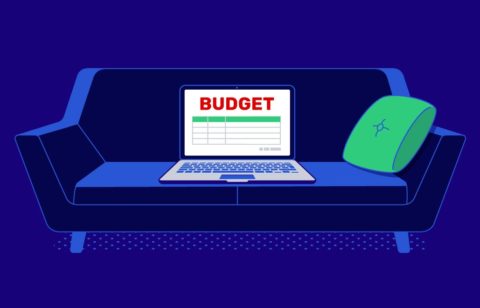Congratulations! You’ve done it. You toughed your way through those four or five years of early morning classes, brain-numbing seminars and midnight study sessions and you’ve graduated. You have your diploma firmly in hand and are all set to move on to the next stage of your life. You may be looking forward to getting a new car, starting a job or even getting married. You’re about to be on your own, maybe for the first time in your life and you suddenly realize your personal finances are all up to you. You’ll definitely have financial challenges ahead of you and need to start thinking about your financial goals for the next 10 to 20 years.
Have you really sat down and thought about your finances and what you need to do in the next few months? If not, here are five simple steps you should be taking to get off on the right foot.
1. Make a budget
To be a good money manager you need to know where your money’s going and how to allocate it in the future. Having a budget is really the only way to control your spending and to make sure you spend less than you earn.
The first step in creating a budget is to determine your monthly expenses and income. Your income will be what you earn, plus any other forms of income such as interest earned, bonuses, commissions or Christmas money gifts from your parents or other relatives.
Next, you will need to calculate your spending. Since you recently graduated, you won’t have much of a history at this point so some of this may have to be pure guesswork. The important thing is to divide your spending into two categories – fixed and discretionary. Here are some typical fixed categories.
- Rent or mortgage payment
- Utilities
- Transportation
- Debt repayment
- Family obligations
Your discretionary categories would include:
- Food
- Clothing
- Health and medical
- Entertainment/recreation
- Pets
- Investments and savings
- Miscellaneous
You will next need to attach numbers to each of these categories. Since you don’t have much of a spending history at this point some of your numbers may have to be “guesstimates.” But that’s okay as you will learn more about your actual spending in the months ahead and can then adjust your numbers accordingly.
Once you’ve totaled up your spending you need to compare it with your income. If you find your spending adds up to more than your income you’ll need to make some adjustments. Since you can’t do much about your fixed expenses you will have to take a hard look at those discretionary categories to see where you could make cuts.
The important and hardest thing about budgeting is sticking to it. Here are some things you could do to make sure you stay on track.
- Make budgeting an integral part of your daily life
- Build in money for the occasional “splurge” or reward such as a night out with the boys or girls.
- Monitor your spending regularly and make changes or adjustments as necessary
2. Make it a priority to save money
You need to be setting aside money whether it’s to create an emergency fund or put in an employer-sponsored savings plan. Because you’re young you have a powerful advantage over older generations, which is time. If you make saving money a priority now, your money will have years and years to grow and you’ll profit from compounding interest. Most people find that the easiest way to save money is to have it automatically taken out of their paychecks and deposited into a savings or investment account. This tends to reduce the “pain” of saving money because you should quickly learn to live on the “net” of your paycheck. Also, if you start saving money when you’re young it will become a habit that will stand you in good stead for all your life.
3. Get a handle on your debt
If you’re typical, you graduated not with just a diploma but with a bunch of student debt. The average amount owed by this year’s college graduates is $29,400. While it’s likely that you don’t owe this much the odds are that you graduated owing on some student loans. If you know how much you owe and to who, good for you. If not, you should go to the National Student Loan Data System (NSLDS). It will have a record of all your federal student loans including, the amount borrowed, the loan provider or servicer, the date the money was distributed and how much you owe. The NSLDS even has a thing called a Loan Portfolio where you could store all the information about your loans. Once you have this information is in hand, you will need to make a plan for repaying your loans.
However, if you had private loans (from a bank or some other for-profit organization), they will not be in the NSLDS and you will have to chase down this information yourself.
 4. Learn why it’s important to have good credit
4. Learn why it’s important to have good credit
There is a simple fact about personal finances. It’s that the higher your credit score, the less it will cost you to borrow money. You can learn your credit rating by going to a site such as www.myfico.com, www.creditkarma.com or www.creditsesame.com. Your credit score is expressed as a three-digit number and the higher the number the better. Lenders usually make decisions about credit based on tiers as follows:
- Between 700 and 850 – Very good or excellent credit score
- Between 680 and 699 – Good credit score
- Between 620 and 679 – Average or OK score
- Between 580 and 619 – Low credit score
- Between 500 and 579 – Poor credit score
- Between 300 and 499 – Bad credit score
If you don’t believe your credit score makes a difference, here are the different interest rates you’d be charged on a mortgage – based on credit score.
760 to 850 5.780% 620-659 7.096%
700-759 6.002% 580-619 8.583%
660-699 6.286% 500-579 9.494%
As you can see from this table if you have a credit score in the low 600s you will pay a lot more in interest than if your score was in the high 700s.
You should also review your credit reports from the three credit reporting bureaus — Experian, Equifax and TransUnion. You can get your reports one at a time from the companies or all together at www.annualcreditreport.com. The reason why you want to get your reports is to review them as they could have errors that are damaging your credit score.
To keep your credit “good” you will need to keep tack of your loan balances and payment dates and develop a plan for paying off your debts. It’s also a good idea to pay off high interest debt first as this would save you the most money.
5. Protect yourself with insurance
Depending on your age you may still be on your parents’ health insurance. If not, you need to sign up for health insurance. Under the Affordable Care Act (often called Obamacare) everyone must have health insurance. If you don’t, you face the very real possibility of having to pay a penalty. If you don’t have health insurance through your parents or employer you will need to purchase a health plan from either a federal or state-based health insurance Exchange Marketplace.
There are some other types of insurance you also need. If you’re a renter, you should get renter’s insurance to protect against the loss of or damage to your personal property. And, of course, you need auto insurance. Your agent should be able to help you choose your coverage but the important part is to make sure you buy good liability insurance to protect you in the event you were to cause an accident where someone is seriously injured.







